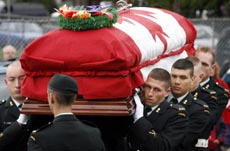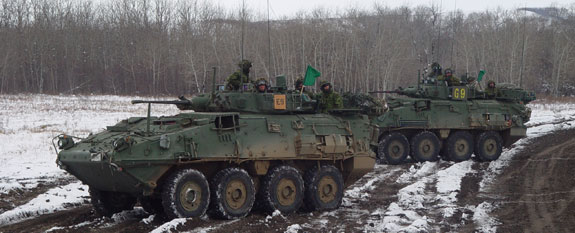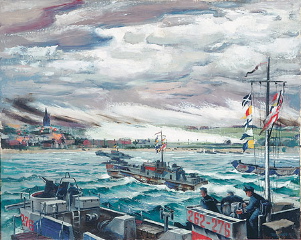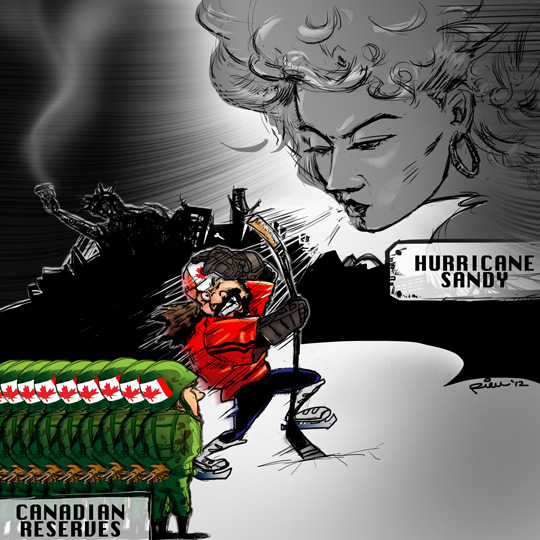Members of the Canadian Forces experience dangerous situations every day while in combat. However, there is another danger that plagues the ranks of the Canadian Forces: suicide. It is an omnipresent threat that can be as hard to predict and defend against as attacks on the battlefield.
Suicides have proven to be a tremendous cost to the ranks of Canada’s military, both among full-time soldiers and the reserves. Canadians should be concerned by this ongoing problem, because it is a huge threat to the readiness and sustainability of the Canadian Forces. In over a decade of combat in Afghanistan, Canada has lost 158 soldiers, which is the most casualties in a single mission since the Korean War. Meanwhile, 187 soldiers have been lost to suicide since 1996.
[captionpix align=”right” theme=”elegant” width=”300″ imgsrc=”http://natoassociation.ca/wp-content/uploads/2013/09/Canada-Military-Coffin-01.jpg” captiontext=”Military Funeral”]
The Statistics
Interestingly, in the past two decades, active members of the Canadian Forces have actually had a noticeably lower suicide rate than the Canadian general public. This trend reverses, however, when examining the suicide rates of Canadian Forces members who have left the military. In fact, there was actually a noticeable increase of suicides among service members that coincided with the drawdown of Canada’s mission in Afghanistan. In 2011, the year that Canada ended its combat role in Afghanistan, 22 soldiers committed suicide. From the beginning of Canada’s mission in 2002 until 2007, there were 11 to 13 suicides per year.
A study conducted by the Canadian Forces found that from 1995-2008, the suicide rate of former service members was 46% higher for males and 32% higher for females as compared to civilians. Even more strikingly, men aged 16 to 24 were twice as likely to commit suicide as civilian men of the same age group. These numbers demonstrate that soldiers remain in a precarious situation even after returning home. Some of the oft-cited factors include post-traumatic stress disorder (PTSD), financial hardships, and the understandably difficult transition from the battlefield.
Canada has gained a reputation for doing a good job of treating returning soldiers with awareness programs and post-deployment screening with mental health workers. However, there are several major problems with the way that the Department of National Defence assesses the suicide problem in the military. For instance, the DND only includes regular force members in their studies on suicide rates, leaving out the large number of reservists who spent time in Afghanistan. Suicides among reservists are generally reported independently outside of the purview of the Defense Department or the Canadian Forces. Even though there are three different military departments that track suicides, none of them has cause-of-death records for part-time reservists. Suicides among reservists go unrecorded unless they occur while on duty.
[captionpix align=”left” theme=”elegant” width=”300″ imgsrc=”http://natoassociation.ca/wp-content/uploads/2013/09/1302283932493_ORIGINAL.jpg ” captiontext=”Remembrance Day Ceremony”]
Outlook for Returning Soldiers
A study that was recently commissioned by Parliament found that approximately 3,000 of the soldiers who fought in Afghanistan are anticipated to suffer from a severe form of post-traumatic stress disorder, while approximately 6,500 will suffer from mental health issues. As a result, the leadership of the Canadian Forces should provide reservists the same mental health treatment, access to decompression centers, and PTSD testing that full-time soldiers receive. Returning reservists don’t only deserve proper treatment of their mental health and assistance with their transition to civilian life, but all Canadians would benefit. Without adequate treatment of all returning service members, the Canadian public will be left to deal with the cost of young, able-bodied people unable to work and contribute to society. Furthermore, there will be an increased possibility of losing a family member or friend who has served in the military.




